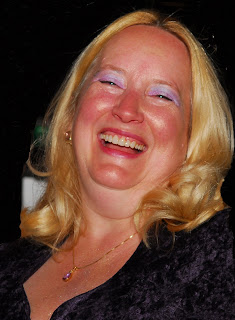But while I am not the cleanest of housekeepers, I do know a lot about cleanliness, indeed some things I wish I didn't know... (keep reading at your own peril!!)
- The human body is home to over 1000 different kinds of bacteria. In fact, there are more germs on your body than the population of the United States. We actually have more bacteria living on us than there are cells in our bodies!
- Housedust is composed of fibers from carpets and textiles, mold and plant spores, food and plant fibers, dander and skin flakes from people and animals, insect and spider parts, pollen, small bits of paper, household insulation and foam backing from carpets, and other minute particles. Dust mites feed off of dead skin cells and of course their excrement also makes up a component of dust. It is this substance that is one of the most common sources of allergens and what people refer to when they say they are allergic to "dust".
- Sorry to disillusion some of you, but there is no "5-second rule" when it comes to dropping food on the ground. Bacteria need no time at all to contaminate something, all they need is contact!
- And yes, in theory you can catch some diseases by sitting on a public toilet seat. Such locations have been found to have both common and unfamiliar strains of bacteria such as E.coli, hepatitis A, streptococcus, staphylococcus, and shigella, as well as strains of common cold and flu viruses and sexually transmitted organisms. But if your immune system is healthy and you always wash your hands afterwards, then you are at very little risk. Most disease-causing organisms cannot live long on the surface of a toilet seat and the chances of contamination to your buttocks or thighs could only occur if you have an open wound when sitting on one, and even then it is very unlikely.
- Killing all bacteria, however, is actually less healthy as most of the over 1000 species of bacteria that make their home on the human body are beneficial to us in a mutual relationship -- we keep them alive and they keep us healthy. Despite some advertisements to the contrary, the more bacteria free you are, the more vulnerable you are to disease.
- Another reason not to invest in anti-bacteria soaps, is that they have been found to be no more effective at preventing infection than regular soaps. In fact, those products containing triclosan actually can alter hormone levels and reduce libido.
- Recent studies of children have shown that those who had an "overly hygienic environment" during their early years (up to age 10) were more at risk to develop asthma and eczema as well as more prone to allergies as they got older. One of the theories behind these results is that the young immature immune systems need to be challenged on a broad scale in order to build up a flexible pathogen resistance.
- The origin of soap was actually a waste product of wood ash and animal fat that was polluting the Tiber river coming down from Mount Sapo. Women found it aided in getting their clothes clean when they did the laundry on the river's banks.
- And early anti-bacterial substance that was used by Egyptians as well as Aztecs was urine. The key chemical in it, urea, was actually effective in treating cuts and burns as it kills bacteria and fungi which are the major sources of infection.
- The founder of the Methodist church in the 1700's, John Wesley, is the author of the famous quote "Cleanliness is next to Godliness." but he was actually referring to clothes, not personal hygiene.
- Society was not always so picky about personal hygiene. In Roman times, the sweat, dirt and oil that a famous athlete or gladiator scraped off himself was sold to their fans in small vials. Roman women reportedly used it as a face cream.
- The medieval saint, St. Lutgard's saliva was believed to heal the sick, as were the crumbs chewed by another saint, St. Colette. A man sent from England to the Netherlands for St. Lidwina's washing water, to apply to his afflicted leg. The water from St. Eustadiola's face- and hand-washing was reported to have cured blindness and other illnesses.
- Austrian men would place a handkerchief under their armpits while dancing and when it had soaked up their sweat and scent, they would use it to wipe the face of the woman they were courting, believing she would be aroused by the odor and fall in love.
- King Henry IV was one of the first royal monarch's to try and move his society towards more cleanliness as he insisted that his knights bathe at least once in their lives during the ritual of knighthood. The rest of society, however, remained firm in their beliefs that bathing was unhealthy. Queen Elizabeth I was regarded as a model of cleanliness in her time. She declared that she bathed once every 3 months, whether she needed it or not. Actually the custom of daily bathing is something that has become common only after the 1950's.
- Monks of an offshoot of the Hindu religion in India, the Jain Dharma, are forbidden to bathe any part of their bodies besides their hands and feet. Their belief is the act of bathing might jeopardize the lives of millions of microorganisms.
- If you eat a lot at fast food restaurants, you might want to skip this factoid! Recent investigations have shown that the ice machines in fast food restaurants have more bacteria and higher concentrations of harmful bacteria than the water in your toilet bowl (assuming you keep your toilet reasonably clean). Fresh toilet bowl water is not necessarily contaminated and pets drinking from the toilet bowl may know more than their owners about clean water!
- Most infections are transmitted by people handling something with germs on it and then rubbing their eyes or putting their fingers in their mouths or touching food that then goes in their mouths. Actually the mouth has a lot of natural defenses against germ attack. "Mother's spit" is not as unsanitary as it might seem as saliva is a natural anti-baterial fluid!But our eyes have very little natural protection.
- One of the most contaminated objects in hospitals are TV remote controls! They are worse than toilet handles and are believed to be a major contributor to the estimated 90,000 annual deaths from infections acquired in hospitals.
- Sufficiently grossed out now? Thought so! I will therefore refrain from the various facts about dental hygiene and lavatory practices except to refer back to back to last week's Tidbits: NASA spent over $23 million dollars designing the toilet for the Space Shuttle which uses suction technology of 860 liters per minute so that it will work in zero gravity (part of the reason why positioning oneself on the seat is so important). Still, I think that is an awful lot of money for a toilet that sucks...





1 comment:
nope not grossed out
I think hygiene is overrated and we are creating allergies and reducing our resistance if we exaggerate.
the remote control tidbit was funny. Never thought of that.
Post a Comment